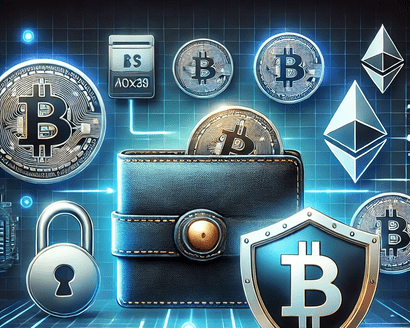Choose a Cryptocurrency Wallet Wisely
The first and most important step to securing your crypto wallet is choosing the right one. There are many products out there, especially now that cryptos are widely used, and it may be confusing for new users.
Those who use crypto wallets to store the funds they've made from crypto exchanges should also look into additional security features. Crypto exchanges allow buying cryptocurrency with credit cards, fiat money, and other cryptos. They also provide their own resources for storing the assets, but those are usually much less secure than cold crypto wallets.
Cold hardware wallets are usually the best way to store large crypto profits since they don't require the user to keep the wallet connected to the internet. Such wallets can't be hacked, as they can't be accessed. When it comes to brands, it's important to distinguish between buying the brand itself and buying the quality features.
Passwords and Private Keys
Regardless of how good a wallet you have, it's always only as weak as the password you've set up. If your private keys are exposed to run a transaction, your assets will be as well, even with offline wallets.
That's why users should pay special attention to generating passwords. Some tools can help you generate new and unique passwords that don't rely on symbolism or math. Instead, the passwords are truly randomized and, therefore, impossible to guess. At the same time, the users should utilize two-step authentication to ensure no fraudulent or accidental transfers.
Private keys also need to be stored offline so that they are not susceptible to hacks. Cold storage devices come with codes that limit who can access them, sometimes by requiring a fingerprint to access the keys and confirm the payment.
Regularly Update Software
Crypto wallets run on complex software that's being updated and improved all the time. This is done behind the scenes and by teams of experts of all kinds. Wallets, therefore, need to have their software updated fairly regularly. Many users overlook this as they feel that they are safe once the assets are in the wallet.
It's best to set up a system on how and when you'll make the software upgrades. One of the ways to go is to update the wallet every time there's a new update to download. Sometimes, this means you'll need to break up your workflow, stop everything, and wait for the update.
Another way to go is to make regular updates a part of your daily schedule and run the update every day before doing anything else with the crypto wallet. This approach requires the user to be vigilant and stick to their schedule.
Be Aware of Small Transactions
Now, when there are more crypto users than ever, and these users come from every part of the world and all ages, there are more scams than ever. The most common are phishing scams in which users provide their email addresses.
The best way to avoid this is to be vigilant and responsible when approving transfers and providing emails. This means that if you get an offer that doesn't seem reliable, it's best to ignore it and not provide your data.
The same goes for carefully monitoring any payments and subscriptions you may have. This is especially the case with small transfers, which are easy to overlook for those with a lot of assets in their crypto wallet. Such small transfers can jeopardize your security just like the large ones.\ Multiple Wallets
In the end, an important step towards securing your crypto wallet isn't about a particular wallet and how you use it but about your overall practice in how crypto wallets are used. Simply put, it never helps to have all your eggs in one basket. Using only one wallet for all currencies and all transactions means that if that wallet is breached, all of your crypto assets will be in danger.
There are many different ways to divide between different wallets. Some users do it based on the cryptocurrency that's stored on them. Others separate the wallets based on purpose, and others keep them for small purchases and subscriptions.
Conclusion
Securing your crypto wallet is crucial for protecting your assets and ensuring safe transactions. Start by choosing a reputable and secure wallet, especially if you deal with significant crypto funds. Cold hardware wallets are recommended for large sums as they offer better security by being offline.
Strong passwords and private keys are essential; use random password generators and keep private keys offline. Regularly update your wallet's software to safeguard against vulnerabilities.
Be vigilant about small transactions and phishing scams to prevent unauthorized access. Finally, diversify your holdings by using multiple wallets to minimize risk. Implementing these strategies will help keep your crypto investments secure.
 EN
EN

